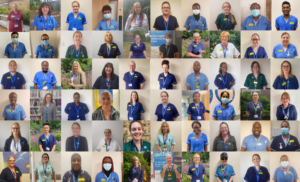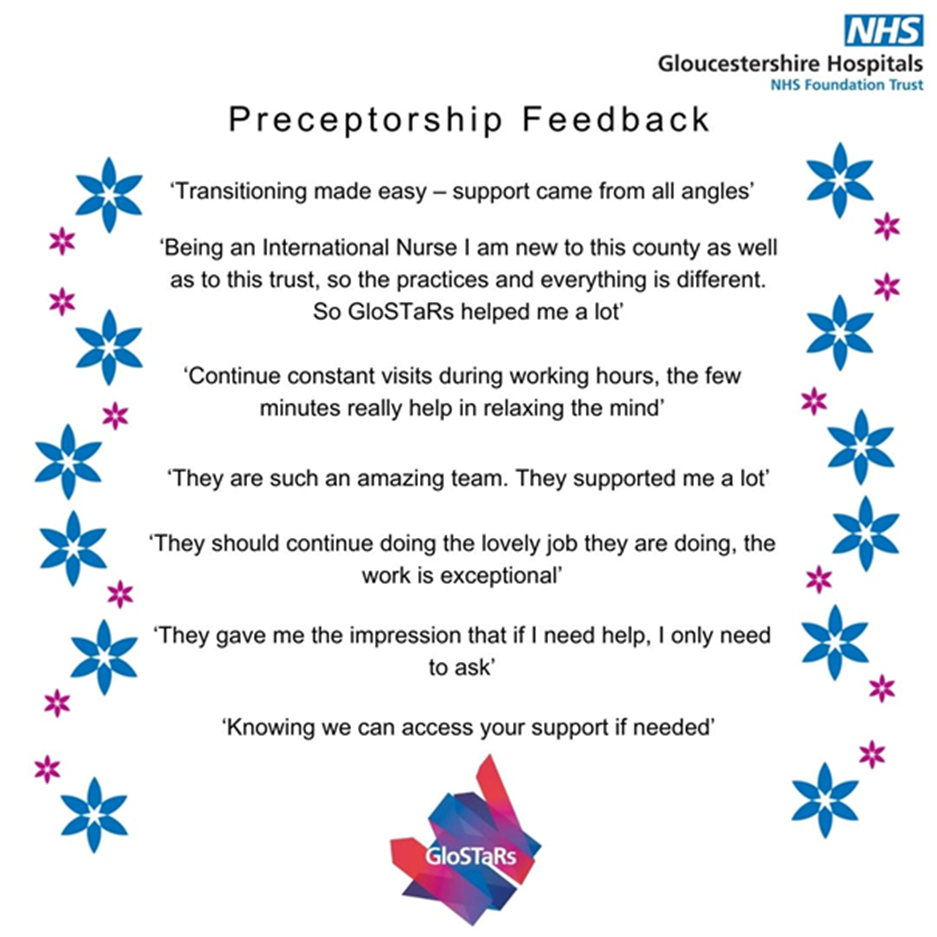This week’s blog comes from Charlotte Jakab-Hall, Senior Practice Development Nurse and Peer Support Guardian and Leonora King, Practice Development Nurse and Peer Support Guardian at Gloucester Hospitals NHS Foundation Trust.
Blog summary
Gloucestershire Staff Transition and Retention Support Network (GloSTaRs) was co-created by two early career nurses following their preceptorship programme in 2018, where they identified a need for improvement in staff wellbeing. The network continuously contributes to building better cultures of wellbeing and peer support in the workplace and staff are provided with a platform for shared decision making. We are proud to have over 150 multi-disciplinary volunteer GloSTaRs Guardians, role modelling peer support across different disciplines throughout the organisation. This approach creates a sense of belonging for our colleagues’, enabling transformation of workplace cultures which in turn will transform patient care.
Gloucestershire Staff Transition and Retention Support Network (GloSTaRs) – Supporting early career professionals to thrive, not just survive.
GloSTaRs was co-created by two early career nurses, with support and buy-in from the organisation’s executive and senior leadership team, a quality improvement project was formed. The aim was to improve the experience of newly registered professionals through peer support in the workplace. Evidence suggests that support from colleagues enables people to thrive in their work, helps them to cope with difficult work experiences, and buffers them from the wider organisational factors that cause irritation and stress (Bliese et al 2017). The Kings Fund (2020) suggests that the consequences of the Coronavirus pandemic have only exacerbated the historic risks we have with workforce stress and burnout, which is further supported in the State of Care report (Care Quality Commission, 2021). The purpose of GloSTaRs is to improve the well-being of staff through shared experiences and reflective practice. The initiative contributes to this by providing peer-to-peer support, career development and signposting through our network of volunteer Guardians. NHS England (2022) announced the urgency of prioritising workforce retention and wellbeing initiatives, with a particular focus on early and late careers.
As part of the GloSTaRs network development, we created ‘Staff Transition and Retention’ (STaR) sessions, which are now embedded within the preceptorship programme which are spread out throughout the preceptorship:
– Introduction to GloSTaRs on their first day.
– ‘Ask me Anything’ session midway through the programme.
– Ending with a focused workshop on ‘career development and ‘next steps’.
In addition, colleagues undertaking the Nursing and Allied Health Professional preceptorship programmes were provided with a workplace peer support check-in. Initially, the Peer Support team had only planned to deliver 1 peer support check-in with preceptees, however, 42% of the March 2022 cohort requested an additional check-in during the preceptorship programme (March 2022 – November 2022). Our work directly impacts the wellbeing of our colleagues which is evident from feedback we have received (see image 1).
Image 1: Examples of preceptee feedback
Reflection is a valuable skill that can influence and enhance patient care through person-centredness approaches, increasing empathy for both patients and colleagues delivering care (Taylor et al 2018, Rothwell et al 2019). The GloSTaRs network uses peer support conversations to drive different approaches to reflection of practice and this can be used to facilitate evidence-based quality improvement. Reflection can encourage healthcare professionals to acknowledge and recognise their emotional responses to experiences in the workplace (McDermott et al 2018). Maben et al (2022) states that in creating psychologically safe spaces to offload, we can help safeguard colleagues against burnout and moral injury. Furthermore, peer support can empower good leadership role modelling and enable colleagues to consider wider issues at micro, meso and macro levels, which in turn helps us to strive for cultures that enable people to flourish (Ng et al 2015).
 We are proud to have recruited over 150 multi-disciplinary volunteer GloSTaRs Guardians, who role model peer support across different professions throughout the organisation. Guardians are easily identifiable in their workplace by their badge, which demonstrates that they are willing and happy to be approached and offer timely support to colleagues. Once inducted, Guardians are given access to a wider source of information and resources, which enables them to signpost colleagues to the right services through person centred support. Colleagues outside of the preceptorship programme can self-refer or be signposted by volunteer Guardians for a peer support or wellbeing check-in. For colleagues requiring more discretion, we have secured a confidential space, which is accessible for any staff wanting to meet away from their work environment.
We are proud to have recruited over 150 multi-disciplinary volunteer GloSTaRs Guardians, who role model peer support across different professions throughout the organisation. Guardians are easily identifiable in their workplace by their badge, which demonstrates that they are willing and happy to be approached and offer timely support to colleagues. Once inducted, Guardians are given access to a wider source of information and resources, which enables them to signpost colleagues to the right services through person centred support. Colleagues outside of the preceptorship programme can self-refer or be signposted by volunteer Guardians for a peer support or wellbeing check-in. For colleagues requiring more discretion, we have secured a confidential space, which is accessible for any staff wanting to meet away from their work environment.
We continue to strive towards a collaborative, inclusive and participative environment to create a sense of belonging for our colleagues enabling transformation of workplace cultures, which in turn we hope will transform patient care (Manley et al, 2021). The need for belonging reflects our desire to feel and be connected to others, supporting our colleagues and teams to care and be cared for within working environments (King’s Fund, 2020). Support from colleagues enables people to thrive in their work, helps them to cope with difficult work experiences, and shields them from the wider organisational factors that cause stress (Bliese et al 2017). As a Trust, we are building upon this sense of belonging to enable us to create the conditions that empower staff to flourish and stay well.
 In summary, the network has been able to identify a clear demand for continuous support with regards to staff wellbeing. This is supported by abundant evidence that indicates staff are at a greater risk of burnout, now more than ever, which has been further exacerbated by the coronavirus pandemic. We believe that GloSTaRs is part of the solution, as we provide an additional network away from direct work environments, offering a safe space to have open, reflective and confidential conversations where staff can raise concerns and make suggestions for quality improvements. While the literature is clear in identifying wellbeing support as a high priority for staff working in healthcare, there appears to be a lack of evidence supporting the application and implementation of these theories in practice. Our future ambition is to be able to share and demonstrate a clear framework which has the capability to be delivered across all healthcare systems.
In summary, the network has been able to identify a clear demand for continuous support with regards to staff wellbeing. This is supported by abundant evidence that indicates staff are at a greater risk of burnout, now more than ever, which has been further exacerbated by the coronavirus pandemic. We believe that GloSTaRs is part of the solution, as we provide an additional network away from direct work environments, offering a safe space to have open, reflective and confidential conversations where staff can raise concerns and make suggestions for quality improvements. While the literature is clear in identifying wellbeing support as a high priority for staff working in healthcare, there appears to be a lack of evidence supporting the application and implementation of these theories in practice. Our future ambition is to be able to share and demonstrate a clear framework which has the capability to be delivered across all healthcare systems.
References
Bliese, P.D., Edwards, J.R. and Sonnentag, S. (2017) ‘Stress and Well-Being at Work: A Century of Empirical Trends Reflecting Theoretical and Societal Influences’, Journal of applied psychology, 1 January, pp. 389–402. Available at: https://search.ebscohost.com/login.aspx?direct=true&AuthType=sso&db=edsbl&AN=RN610317143&site=eds-live
Care Quality Commission (2021) State of Care report: Workforce stress and burnout [Online]. Available from: Workforce stress and burnout – Care Quality Commission (cqc.org.uk)
Maben, A. Conolly, R. Abrams, E. Rowland, R. Harris, D. Kelly, B. Kent, K. Couper. (2022) ‘You Can’t Walk Through Water Without Getting Wet’ UK Nurses’ Distress and Psychological Health Needs During the Covid-19 Pandemic: A Longitudinal Interview Study. International Journal of Nursing Studies[online]. 131 [Accessed 21 April 2023].
Manley, K., Wilson, V., Oye, C. (2021) International Practice Development in Health and Social Care. 2nd ed. London: Wiley-blackwell.
McDermott H, Husbands A, Brooks-Lewis L (2018) Collaborative team reflective practice in trauma service to improve health care. Journal of Trauma Nursing. 25, 6, 374-380. doi: 10.1097/JTN.0000000000000404
Ng SL, Kinsella EA, Friesen F et al (2015) Reclaiming a theoretical orientation to reflection in medical education research: a critical narrative review. Medical Education. 49, 5, 461-475. doi: 10.1111/medu.12680
NHS England (2022) Retaining our nursing and midwifery colleagues. B1711_Retaining-our-nursing-and-midwifery-colleagues-13-July-2022.pdf (england.nhs.uk)
Rothwell C, Kehoe A, Farook S et al (2019) The Characteristics of Effective Clinical and Peer Supervision in the Workplace: A Rapid Evidence Review. http://www.hcpc-uk.org/globalassets/resources/reports/research/effective-clinical-and-peer-supervision-report.pdf
Taylor C, Xyrichis A, Leamy MC et al (2018) Can Schwartz Center Rounds support staff with emotional challenges at work, and how do they compare with other interventions aimed at providing similar support? A systematic review and scoping reviews. BMJ Open. 8, 10, e024254. doi: 10.1136/bmJopen-2018-02425
The Kings Fund (2020) The courage of compassion Supporting nurses and midwives to deliver high-quality care [Online]. Available from: https://www.kingsfund.org.uk/sites/default/files/2020-09/The%20courage%20of%20compassion%20full%20report_0.pdf


